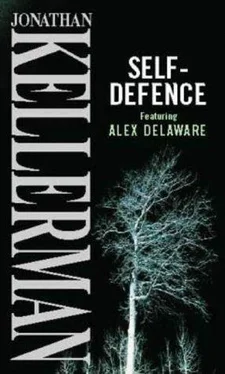I stared at a stuffed owl.
He said, "Where's the girl?"
Nova said, "Be nice to him, Buck," in an overly sweet tone. "He came all the way here to tell you something important."
I stared at her. She shrugged and walked over to a window.
I said, "Did I?"
She said, "Didn't you? You're the expert."
Then she left.
Lowell watched her. "Those cheeks," he said. "Like sugar-coated sponge rubber. To be between them… What's on your mind, Dimestore? The girl still working on her bruised-virgin courage, dispatching you on another reconnaissance mission?"
"It's Puck," I said. "He's dead. Drug overdose."
He nodded. Stopped. Clamped both hands down on his wheels and turned his back on me.
"All right," he said, very quietly. "All right, you've delivered the message. Now fuck you to hell. If I see you again, I'll kill you."
He showed up two days later at the funeral, arriving late, wheeled across the rolling lawn of the cemetery by Nova. Conspicuous in a white suit and shirt and a wide-brimmed straw hat. He stayed well back from Lucy and Ken as a minister on call to the mortuary recited a dispirited prayer. Once, Nova's eyes met mine and tried to hook me into a staring contest. One of her hands touched a breast. I turned my attention back to the service.
The cemetery was one of those hundred-acre things yearning to be a theme park: offices in a colonial mansion, bulldozed hillocks of golf turf, replicas of Michelangelo's statuary cropping up in odd places. Instead of gravestones, brass plaques were set flush with the ground. Ken had bought Peter's strip of perpetuity yesterday, after Milo'd helped speed release of the body.
I'd spent a good part of the past forty-eight hours at the house on Rockingham. Ken and Lucy had been nearly inert, eating little, resting a lot, barely capable of speech.
I'd experienced some inertia myself, not following up on Curtis App or doing anything else about Karen Best. Sherrell Best had phoned once, and I'd had my service call him back to say I'd get to him in a couple of days. The grief of the moment loomed so huge, it seemed to have blotted out the dream. I wasn't sure when- or if- Lucy would ever return to it. Still, as I stood there among all that barbered green, it chewed at me.
A few feet behind me, two laborers waited under a tree.
The minister said something about the puzzles of life and God's will. Then he shot a glance at the laborers and they came over. One of them activated a motor attached to thick cloth straps that supported the gray lacquered coffin. The straps loosened very slowly and descended. As it hit bottom, it made a resonant, almost musical sound, and Lucy let out a high, agonized wail. Ken held her and rocked her as she cried into her hands.
Behind them, Buck said something to Nova.
The laborers began shoveling dirt on the coffin.
Each clump made Lucy cry out. Ken's face looked ready to crumple.
Buck shook his head, and Nova wheeled him away.
The chair bumped its way over the grass, catching a couple of times and forcing Nova to free its wheels. Finally, she got it to the curb of the swooping drive where the hearse sat and worked a long time getting Lowell out of the chair and into the Jeep. Folding the chair and stowing it in back, she sped off.
***
I dropped Milo off at the West L.A. station and drove back to Malibu. Shooting the Curl was still closed.
Had I flushed the prey too well?
I stopped off at the Malibu civic center and killed an hour locating a business license for the surf shop.
When the original papers had been filed, the Sheas had been living on the land side, up Rambla Pacifica. Three years later, they'd moved to the 20000 block of Pacific Coast Highway.
I drove back south and found the place: a one-story Cape Cod, white board and green shutters, squeezed between two bigger stucco edifices. Probably one of the original beach structures of the twenties and thirties, reminiscent of a quieter, simpler Malibu. Sometimes big storms washed the old places out to sea.
I rang the bell. No answer. The knocker was a bronze sea lion patinaed with salt. I used it to drum the green wooden door a couple of times. Still nothing. Neither Gwen's customized van nor Tom's BMW was in sight. But no mail in the box, not even throwaways.
I went home and called the Producers Guild and learned that Curtis App was president of New Times Productions in Century City.
A call to New Times got me a voice mail system that required an engineering degree to understand. I pushed 6 to speak with Mr. App and got cut off.
It was just after noon.
I drove into the city, heading straight for the university library.
The computer held a dozen references to App, the most recent being five-year-old reviews of a movie he'd produced called Camp Hatchet II.
Bomb review. Maybe that was his spiritual link with Lowell. The next seven citations were more of the same. Then I found a thirteen-year-old article in American Film entitled APP ON THE DEFENSE: TEEN PIX PRODUCER SAYS HE KEEPS KIDS OUT OF TROUBLE.
The magazine hadn't been microfilmed, but it was in the stacks. The article was an interview in which App acknowledged the dreadful critical notices he'd received on each of the nine soft-sex blood-and-gore flicks he'd produced and admitted that "my pictures aren't Dostoyevsky, they're popcorn for the head. But no pubic hair or nipples. Kids watch them, space out, and have a good time in the drive-in. When they're there, they're off the streets, so think of it as public service programming. As a parent, I'd rather have my kid watch Janey Makes the Squad or Red Moon Over Camp Hatchet than a lot of the garbage that's on network TV."
The accompanying color photo showed App sitting in the driver's seat of a long-snouted red Ferrari convertible, a satisfied smile on his face, a perfect sky and palm trees in the background.
From the narrowness of his shoulders, a small man. Thin face with ratlike features and an extremely pointed chin.
Gray hair, Caesar cut, white tennis shirt, red sweater that matched the Ferrari. Great tan.
No mention of his ever optioning Lowell's book, so either I'd guessed wrong about that or it was something he wanted to forget.
Scrolling back, I came across nothing on him for the next nine years, then a piece in The Wall Street Journal entitled RETAIL FOOD A GROWTH MARKET.
It turned out to be one of those center-of-the-front-page lightweight articles the Journal runs in order to amuse nervous businessmen. The full title read Retail Food a Growth Market If Consumers' Special Needs Are Met: Curtis App Likes Sprouts and Jicama.
Back in those days- three years before the Sanctum party- App had been a financial analyst for an investors' group specializing in supermarket chains, vending machines, coin-op laundries, and fast-food outlets. In the article he predicted that retailers were going to have to cater to ethnic and special needs to be successful in an increasingly competitive market.
A photoengraving showed the same pointy face with full dark Beatle-length hair.
From groceries to slasher flicks? An association with Lowell must have seemed the next step toward High Art.
I left the library and stopped at an instant-print place in Westwood. No other customers in the store, and it took exactly twenty-three minutes to obtain fifty business cards.
Good paper, ecru shade, classy embossed script.
Sander Del Ware
Freelance Writer
Below that, a phony post office box in Beverly Hills and a phone number I'd used ten years ago while in private practice. Putting three cards in my wallet and the rest in the trunk of the Seville, I headed for Century City.
Читать дальше












